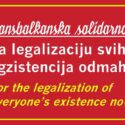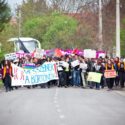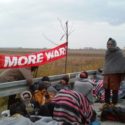Tag: balkan route
-
Balkanroute Calling: Caravan for Freedom of Movement (Trieste -> Border crossing Maljevac)
von Campagna Lesvos calling, YaBasta Bologna ITA – ENG – ESP – DE – FR Balkanroute calling: carovana per la libertà di movimento Sabato 19 giugno da Trieste a Maljevac confine croato-bosniaco Il 29 maggio in tutta Italia e Europa iniziative di avvicinamento alla carovana, contro l’esternalizzazione delle frontiere e il rifinanziamento della guardia costiera libica.Sabato 19…
-

COVID-19: No one is safe until All are protected!
Open Letter from the Transbalkan Solidarity Group Currently there are tens of thousands of refugees and other migrants in the Balkans. Some of them are accommodated in official collective centers, while a large number of people fall outside the system, surviving through the help of the local population and support provided to them by volunteers…
-
THE BLACK BOOK OF PUSHBACKS
by Border Violence Monitoring Network To coincide with International Migrants Day on 18th December the Border Violence Monitoring Network (BVMN) have released a landmark publication on illegal border pushbacks. The ‘Black Book of Pushbacks’ brings together a wealth of evidence on these violations, analysing in detail the way that these brutal acts have become systematised…
-
Ahmed H.’s trial, act two
from Free the Röszke 11 Ahmed H.’s trial, act two – 2nd instance court decides Ahmed H.s terrorism charges need to be re-consider due to “lack of reasoning and interpretation” Two days ago, on the 15th of June 2017 in Szeged, Hungary, Ahmed H. had his second instance trial, after being sentenced to 10 years of…
-

A report from an activist perspective on current protests in Hungary and Serbia
September 2015. Tens of thousands of people are on their way to Western Europe. Thousands are stuck at the Keleti train station in Budapest. On the 4th of September, in increasingly difficult conditions, they decide no longer to wait for the trains to take then on, but start walking towards their destination. As in the…
-
#RefugeesSRB We Are Still in #Serbia
Posted on April 16, 2017 by Enough is Enough! We are still in Belgrade. One of us joined the Cars Of Hope Wuppertal team, who are working with refugees and support the Soul Welders projects in the Serbian capital. Another short impression from Belgrade. Written by Riot Turtle Solidarity not charity! The situation in Belgrade changed…
-

“March of Hope” > zu Fuß auf dem Weg von Belgrad zur kroatischen Grenze
Am Freitag nachmittag, 11.11.2016 haben sich 200 Geflüchtete zu Fuß auf den Weg gemacht und hoffen auf Einlass an den Pforten der Festung Europa – an der kroatischen Grenze. Unterwegs auf der Autobahn zwischen Belgrad und Zagreb, eskortiert von der Polizei. Hinter ihnen bilden sich kilometerlange Autoschlangen. Stimmung ungebrochen. Geflüchteten hatten sich auf den Weg…
-
Pressemitteilung Solidarity4all – Bündnis
PM vom 25.07.2016 Stadt versucht aus politischen Gründen ein Camp das Solidarity4all – Bündnis zu verhindern Protestcamp Bamberg 04. bis 07. August 2016 – ARE Bamberg: Stadt blockiert Verhandlungen Ein breites Bündnis wird im August ein mehrtägiges antirassistisches Protestcamp gegen die Ankunfts- und Rückführungseinrichtung (ARE) in Bamberg mit Kundgebung vor dem Lager, Demo durch Bamberg…
-
Das Denkmal für die ermordeten Roma und Sinti Europas in Berlin: Kein Platz für politischen Protest, Platz für Polizeieinsatz
Statement von alle bleiben Berlin, 24. Mai 2016. Die Polizei räumt kurz nach Mitternacht die Versammlung der Roma, die sich abends dort eingefunden hatten – um gegen ihre Abschiebungen zu protestieren und sich Bleiberechte zu erkämpfen. Familien mit teilweise sehr jungen Babys, Kindern und Jugendlichen aus Norddeutschland waren nach Berlin gekommen, damit ihre Situation von…
-
Support structures for migrants in Belgrade under attack
Call from NoBorders Hostel collective Comrades, read, share, resist! URGENT:The political management of migrations on the Balkan Route has entered into yet another phase. Ever since the EU-Turkey Deal came into force at the end of March, one of its main parts was the repression targeting both the people traveling through the Balkans and the…